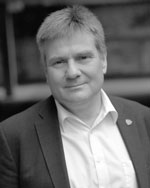
 MEMS - an enabling key technology
MEMS - an enabling key technology
Objectifs du cours
After attending this course, the participants will have a sound knowledge in current MEMS sensors and devices, their design and fabrication, well prepared to enter the commercial opportunities this field currently is offering.
MEMS (Micro-electro-mechanical systems) are undoubtedly an enabling key technology for the 21st century, as they can contribute to solutions for practically all grand societal challenges humanity is facing, such as sustainable growth, mobility, environmental problems, health and renewable energy. This fascinating and multidisciplinary research field will certainly strongly grow over the next years, and already represents an important economic factor. MEMS based technology currently has an estimated worldwide revenue of 20-25 billion USD and a forecast of 15-20% annual growth for the foreseeable future.
The short course will provide an introduction to MEMS sensors and devices. The first day will present some market forecasts and a general overview of the field. It then will focus on fabrication technologies on how to realize MEMS devices. The second day will mainly focus on applications of MEMS devices, their operation and future developments. MEMS devices that will be discussed will include physical sensors such as accelerometers, gyroscopes and pressure sensors, which now can be found in very smartphone, but also include inertial sensors for aerospace applications and oil & gas resource detection, resonant based sensors for bio-medical applications, sensors for autonomous vehicles (e.g. MEMS scanning mirrors for LIDARs), energy harvesters, chemical sensors for environmental monitoring and pressure sensors for medical and industrial applications.
The short course will also briefly review recent trends in industry and academia and highlight emerging technologies that are promising for future developments, such as coupled resonators, piezoelectric transducers and devices, as well as packaging, which is often an underestimated field.
Public cible
Engineers from companies planning to enter or recently have entered the field of MEMS devices. Postgraduate university students planning to work on MEMS for their PhD or Master project.
Contenu
- What is MEMS? (Where did MEMS come from? - Definitions of MEMS, Microsystem technology and Nanotechnology - Scaling laws- Some real world examples)
- Economic Status and Predictions of High Value MEMS (Current Market and their economic status - Market data for various MEMS devices and their applications - Main MEMS players)
- Technologies for MEMS Sensors and Devices (MEMS fabrication processes - Transduction technologies - Interface and control circuits
- Inertial Sensors (Accelerometers - Gyroscopes - Applications areas - Practical examples)
- MEMS Pressure Sensors (Principles of operation - Pressure sensors for automotive applications - Pressure Sensors for consumer applications - Pressure sensors for medical applications)
- Biomedical Sensors and Devices (Implantable sensors and devices)
- Biochemical Sensors and Devices (Electrochemical sensors - Environmental sensors based gravimetric principles)
Enseignant(s)

Michael Kraft est professeur de micro- et nanosystèmes à l'Université de Louvain, département de génie électrique, groupe MICAS.
Français De 2015 à 2017, il a travaillé à l'Université de Liège, Département de génie électrique et informatique, et de 2012 à 2014 à l'Institut Fraunhofer pour les circuits et systèmes microélectroniques à Duisbourg, en Allemagne, où il a dirigé le Département des micro- et nanosystèmes axé sur les microcapteurs entièrement intégrés et les systèmes biohybrides. Il a occupé simultanément la chaire W3 de micro- et nanosystèmes intégrés à l'Université de Duisbourg-Essen. De 1999 à 2012, il a été membre du corps enseignant et professeur de technologie des microsystèmes à l'Université de Southampton, au Royaume-Uni. Parallèlement, il a également été directeur du Southampton Nanofabrication Centre. Il est titulaire d'un diplôme d'ingénieur. (Univ.) en génie électrique et électronique à l'Université Friedrich Alexander d'Erlangen-Nuremberg en 1993. En 1997, il a obtenu un doctorat de l'Université de Coventry sur le développement d'un accéléromètre MEMS. Il a ensuite passé deux ans au Berkeley Sensors and Actuator Centre de l'Université de Californie à travailler sur des gyroscopes MEMS intégrés.
Il a 20 ans d'expérience dans les techniques de micro- et nano-fabrication, les microcapteurs et les actionneurs et leurs circuits d'interface, en particulier pour les capteurs capacitifs. Il s'intéresse largement aux MEMS et à la nanotechnologie, allant du développement de processus à l'intégration de systèmes de MEMS et de nano-dispositifs. En 2005, son groupe de recherche a développé la première interface modulateur sigma-delta (SDM) du cinquième ordre au monde pour un accéléromètre MEMS, et en 2007 un SDM passe-bande pour un gyroscope MEMS. Il a réalisé des travaux révolutionnaires sur les micro-objets à sustentation électrostatique pour des applications de détection et d'actionnement, et a développé plusieurs puces atomiques et ioniques micro-fabriquées innovantes. Il a publié plus de 250 publications dans des revues à comité de lecture et des conférences en tant qu'auteur ou co-auteur. Il a également contribué à trois manuels sur les MEMS et édité un livre sur les MEMS pour les applications aérospatiales et automobiles. Il a siégé ou siège actuellement à plusieurs comités directeurs et techniques de conférences internationales telles que IEEE Sensors, Eurosensors, Transducers, ISSCC, MNE et MME, et est également rédacteur en chef de la revue IEEE Sensors Letters et rédacteur associé du Sensors and Sensor Systems Journal. Il a également effectué des missions de conseil industriel pour de nombreuses entreprises actives dans le domaine des MEMS.
| Date et Lieu (jj.mm.aaaa) | Ce cours n'est pas agendé en ce moment. Veuillez nous contacter en cas d'intérêt |
| Coût (EARLY BIRD) | CHF 1'300.00 |
| Coût | CHF 1'500.00 |
| Langue | English |
| Inscription | Deux semaines avant le cours |
| Organisation | FSRM, Fondation suisse pour la recherche en microtechnique |
| Informations et inscription | Gilles Delachaux, FSRM, e-mail: fsrm@fsrm.ch |
